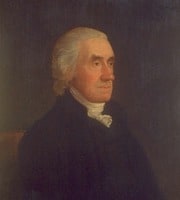Robert Treat Paine was a native of Boston. His parents were faithful Christians. For some years, his father was the pastor of a church in Weymouth. When his health began to fail, his father entered into the mercantile business. His mother was the granddaughter of Governor Treat of Connecticut.
Robert Paine attended Harvard College at age fourteen. Upon graduation, he taught in the public school. Before studying law, he took some time to study theology. In 1755, he was the chaplain of the provincial troops and later preached in other churches.
He eventually continued his education in law. During his studies, he supported himself financially by teaching school.
He established a law practice in Taunton. While there, he developed a keen interest in the disputes between the colonies and the British government. When Governor Bernard abruptly dissolved the general court, he attended a convention in Boston to discuss their grievances. Although the governor attempted to stop the meeting, the delegates met anyway. They decided that if England continued to violate their rights, they would act independently of the governor.
The Boston Massacre
After the Boston massacre in 1770, Robert Paine prosecuted Captain Preston (http://www.bostonmassacre.net/players/preston-biography.htm) and his men for murder. Unfortunately, Paine lost the case to John Adams. Preston and his men were acquitted of all charges.
After the trial, Robert Paine served Massachusetts in the General Assembly. As a representative, Paine tried to protect the rights of the colonists. England, however, was inflexible. In 1774, citizens elected Paine to the Continental Congress. The Congress decided to appeal to King George and present him a list of their grievances. They hoped to have the King respect and restore their rights.
While they awaited the King’s response, the Congress appointed Robert Paine to the task of manufacturing saltpeter, an important element in the production of gunpowder. Paine was also instrumental in the production of cannon and other war implements.
When the Congress received the King’s response, they decided that independence was their only recourse. In 1776, Robert Paine voted for independence and later signed his name to the Declaration of Independence.
In December 1776, the British army was advancing quickly toward Philadelphia. Unfortunately, Washington’s troops numbered only one-third of the force of the British army. Congress adjourned to Baltimore.
Robert Paine: Massachusetts Patriot
Between sessions of the Continental Congress, Robert Paine served in several important offices in Massachusetts. Firstly, he assisted the Commonwealth in forming a state constitution. Secondly, Massachusetts appointed him as attorney general. Finally, in 1790, the commonwealth appointed him as a Supreme Court Justice. He served on the Supreme Court until 1804, when he retired at age 73.
As a lawyer, Paine’s accomplishments were many. He believed that the law should be followed to the letter. However, if a person was repentant, he could be tender.
As a judge, Paine served fourteen years. He retired when his deafness affected his ability to hear a case.
Paine was well-known as a scholar. He was a founder of the American Academy established in Massachusetts in 1780. Harvard University conferred upon him the honorary degree of doctor of laws.
He was a firm believer in the divine origin of the Christian religion. He believed the Scriptures as a revelation from God, designed to instruct mankind in duty and to guide them to salvation.
Robert Paine died on May 11, 1814 at the age of 84.
